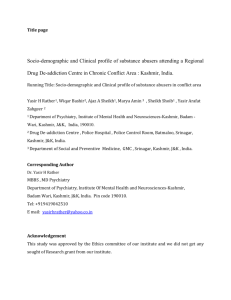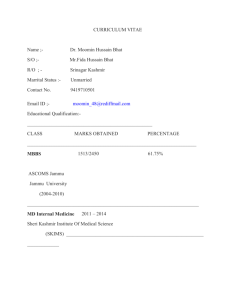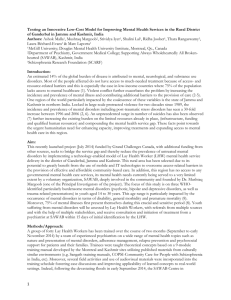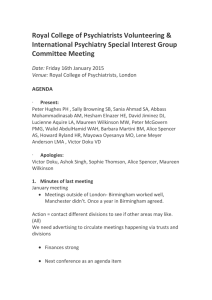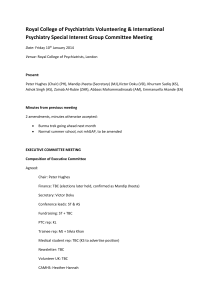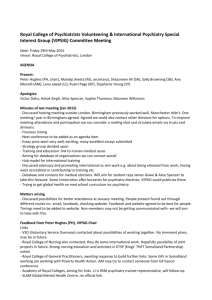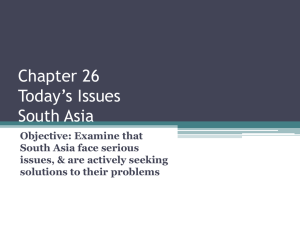Project Proposal for Ganderbal Project
advertisement
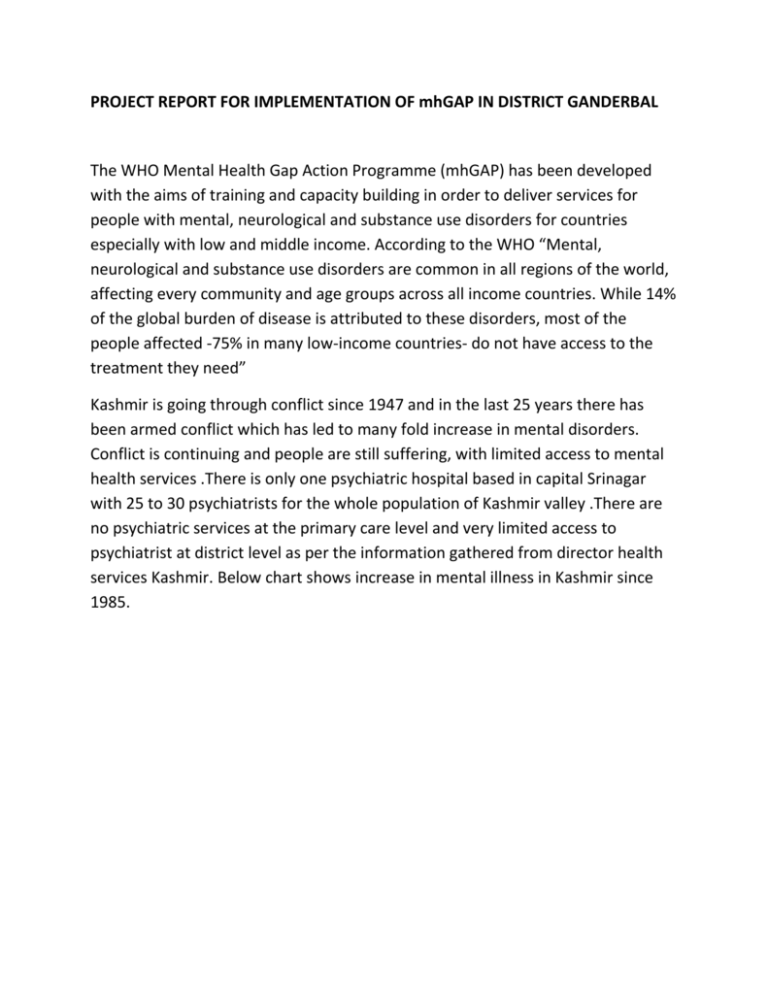
PROJECT REPORT FOR IMPLEMENTATION OF mhGAP IN DISTRICT GANDERBAL The WHO Mental Health Gap Action Programme (mhGAP) has been developed with the aims of training and capacity building in order to deliver services for people with mental, neurological and substance use disorders for countries especially with low and middle income. According to the WHO “Mental, neurological and substance use disorders are common in all regions of the world, affecting every community and age groups across all income countries. While 14% of the global burden of disease is attributed to these disorders, most of the people affected -75% in many low-income countries- do not have access to the treatment they need” Kashmir is going through conflict since 1947 and in the last 25 years there has been armed conflict which has led to many fold increase in mental disorders. Conflict is continuing and people are still suffering, with limited access to mental health services .There is only one psychiatric hospital based in capital Srinagar with 25 to 30 psychiatrists for the whole population of Kashmir valley .There are no psychiatric services at the primary care level and very limited access to psychiatrist at district level as per the information gathered from director health services Kashmir. Below chart shows increase in mental illness in Kashmir since 1985. INFORMATION FROM GOVERNMENT PSYCHIATRIC DISEASE HOSPITAL mhGAP is being implemented in over 50 countries in the world and this is the first programme in the Indian subcontinent. The Kashmir pilot project is supported by WHO Geneva WHO South Asia and Royal College of Psychiatrists UK. DISTRICT MENTAL HEALTH PROGRAMME It is the flag ship mental health intervention in India. It envisaged a decentralized community based approach to the problem including 1. Training of the mental health team at the identified nodal institutes within the state 2. Increasing awareness about mental health problems and effective health seeking pattern. 3. Adequate provision of services to promote early detection and treatment of mental illness in the community itself with both OPD and indoor treatment and appropriate follow up measures. 4. Collecting data and experience for future planning, research and improving service provision. LIMITATION TO IMPLEMENTATION OF DMHP were identified in a report by ----- dated -----------------1. Larger treatment Gap in universal access to mental health services. 2. Lack of Technical support 3. Absence of uniform guidelines 4. Deficit of simple treatment guidelines used by PCHW in identification and management of mental illness. 5. Lack of focus on the rights of person with mental illness. 6. No information on attendance and clinical and functional outcome. 7. Mental Health not included into Health Monitoring Information Syst8em. 8. Inadequate Human resources and training: Project background and description The project began out of an idea between a UK and Kashmiri Psychiatrist Dr Sayed Aqeel Hussain during a UK mhGAP training event. A situational analysis was conducted which indicated the following Poor access to mental health services in rural Kashmir Poor treatment standards Inappropriate treatment for those with mental health problems Lack of mental health drugs National project to develop and implement a District mental health policy but delayed for Kashmir incorporating mental into into primary care mhGAP is a WHO programme to facilitate capacity building in mental health at a primary care integrated health care model. The model is now being rolled out in over 50 countries. However there remains little evaluative information on roll out after initial trainings. The project began with a preliminary training for 120 health professionals from all over Kashmir –health, social work and education in 2013. Aims of the project Increased access of population of Ganderbal district to mental health in integrated primary care model Improved mental health care of people of district in mental health Objectives of the project are Training of all GPs in Ganderbal district of Indian Kashmir in mhGAP implementation guide tool. the implementation of an mhGAP based integrated mental health primary care service in one district of Kashmir namely Ganderbal. Supervision framework for 1 year for GPs in Ganderbal. Indicators that will be monitored are Number of cases recorded in Primary care with a diagnosis of mental health Prescription number for mental health condition Indirect indicators of mental health medication use patient satisfaction-sampling survey Supervision documents-this is the measure of quality of care. Psychosocial interventions – this is not feasible to measure currently but will be considered by project committee. Tools mhGAP implementation guide and ideally adaptation exercise including trauma module. Supervision tool Monitoring and evaluation tool Global assessment of function scale Our priority is simplicity and not to add workload to GPs or supervisors. The project has support from the director of health services in Kashmir. The project is being coordinated by a local lead Psychiatrist Dr Sayed Aqeel Hussain in Kashmir as the focal point through a coordinating steering committee. Training was repeated in August 2014 and focused on primary care physicians in Ganderbal district. Meeting was held with CMO, BMO and medical officers of Ganderbal district to establish a robust supervision, monitoring and evaluation system over the following year as per supervision and monitoring framework. Budget is limited and necessarily will need funding to implement the proposed project although Director of Health Services has provided some financial support for training and further support will be difficult to fit into current budget from Director of health Services. A log frame has been developed for the programme, which covers initiation, budget, training, supervision, monitoring and evaluation. Most of the materials and tools of WHO can be used directly for the project but some may need local adaptation. (Please see the enclosed logframe) Proposal One year of mhGAP implementation by doctors in Ganderbal district with a supervision frame work in place as per the WHO document. (See folder) Ganderbal has been chosen as a pilot site to implement this programme and will act as model of good practice for dissemination to other districts of state. Support from the health department is essential for this to be implemented and incorporated into the District Mental Health programme seamlessly. mhGAP programme compliments the District Mental Health Programme strategy. Implementation Strategy To date there have been 3 phases of training in Kashmir supported by the Director of Health Kashmir. There has been extensive background preparation for the implementation of the pilot. (See folder) A framework of supervision will ensure that health professionals deliver high quality, consistent, cost effective and evidence based treatment. Block medical officers and Medical officers of Ganderbal district have been identified as supervisors. Funding is one of the limitations of the project although so far we have been able to get support from Director Health services Kashmir and some local voluntary organizations and voluntary worker. (Budget details encloseds) WHO Monitoring and evaluation strategy document will be used. (See folder) This will demonstrate success of the programme in a measureable way. Framework for the project implementation has been established and Dr Sayed Akeel Hussain and Dr Muzaffer Khan are joint project coordinators. It is innovative in being sole mhGAP project in India to our knowledge but a lot of mhGAP interest developing throughout the country Following a series of meetings over last one year steering group with below terms of reference was formed for development and implementation of the project in district Ganderbal. According to 2011 census, Ganderbal has population of 297446 of which 158720 are males and 138726 females. There are total 50,594 children aged 0-6 of which 27,159 boys and 23,435 girls forming 17.01 percent of the population of Ganderbal District. Average literacy rate of Ganderbal district is 58.04 percent Males 68.85 percent and Females 45.71 percent. (Please see enclosed details of Ganderbal District health structure) TERMS OF REFERENCE Steering committee Members – Dr. Sayed Aqeel Hussain, Dr. Muzaffer Khan, CMO of Ganderbal district, Technical member – (distant). Other stakeholders can be invited to attend periodically Frequency of meetings every 4 months -3 per year – venue at Ganderbal or Srinagar. Minuted and recorded for all stakeholders Agenda to be established by chair -Chair is Dr. Muzaffer Quorum of 2 people Roles of people – Dr Aqeel Hussain –lead for mhGAP project, Chair may delegate tasks to others Admin support – to be negotiated Committee aims – a) Setting up mhGAP programme in Ganderbal district b) Review of all relevant documents c) Supervision records reviewed and monitored d) Monitoring and evaluation tool reviewed e) Strategic development f) Link to local health stakeholders g) Strategy on link to district mental health programme Committee to be reviewed in 2016 Minutes available on demand Stake holders Dr Sayed Aqeel Hussain –coordinator of project Dr Mohd Muzafer Khan co- coordinator Zonal Medical Officers –Ganderbal Block Medical Officers Chief medical officers Primary health care staff –nurses and doctors –Ganderbal District Pharmacist-state and district Director of Health Services Kashmir Commissioner Secretary Health and medical education Medical College Srinagar Government Psychiatric hospital, Srinagar NGOs in district (ACTION AID INDIA) Community leaders in Ganderbal district WHO Royal College of Psychiatrists Dr. Peter Hughes and Dr Sajad Yousuf –UK coordinators PRIME Service users and cares in district Professional links WHO- WHO is an important source of technical and programmatic support PRIME- PRIME can be a source of advice on scale up and research Royal College of Psychiatrists –Volunteer scheme can provide volunteers for training, supervision and programmatic support. College supports the programme and MOU was signed between Royal College of Psychiatrists London and Health and Medical Education Department of Jammu and Kashmir India. (Please see the document enclosed for details). E support for Developing Mental Health Service in Kashmir, India has been put in place and following have agreed to provide advice and technical support for the project. Eleni Palazidou –mhGAP Trainer for first mhGAP training in kashmir Peter Hughes- lead for both batches of mhGAP Training in kashmir Sajad Yousuf- A Uk based Psychiatrist of kashmiri origin mhGAP Trainer for both batches of Training in kashmir Pia Gosh- have experience and want to be involved in kashmiri project Rabia Khan- have experience and want to be involved in kashmiri project List of references Satisfaction with mental health services among people with Schizophrenia in five European sites: Verona Service Satisfaction scale-Schizophrenia Bulletin Vol 29,No 2, 2003 Ruggeri et al Translation and cross-cultural adaptation of outcome measurement for Schizophrenia- Epsilon Study. Knudsen et al Translation and cross-cultural adaptation of a mental health battery in an African setting- Smit et al African health sciences Vol 6 No 4 December 2006 GAF scale Global adaptive function scale WHO tools supervision and monitoring and evaluation –EZ COLLAB WHO website mhGAP Implementation Guide -WHO Data from Government psychiatric disease hospital. http://mhpolicy.files.wordpress.com/2012/07/final-dmhp-design-xiiplan2.pdf http://sayedaqeel.wix.com/kndri http://jkhealth.org/districtjam.php?link=Ganderbal http://bjp.rcpsych.org/content/204/6/415/reply http://www.rcpsych.ac.uk/pdf/VIPSIG%20Summer%202014%20New sletter.pdf


